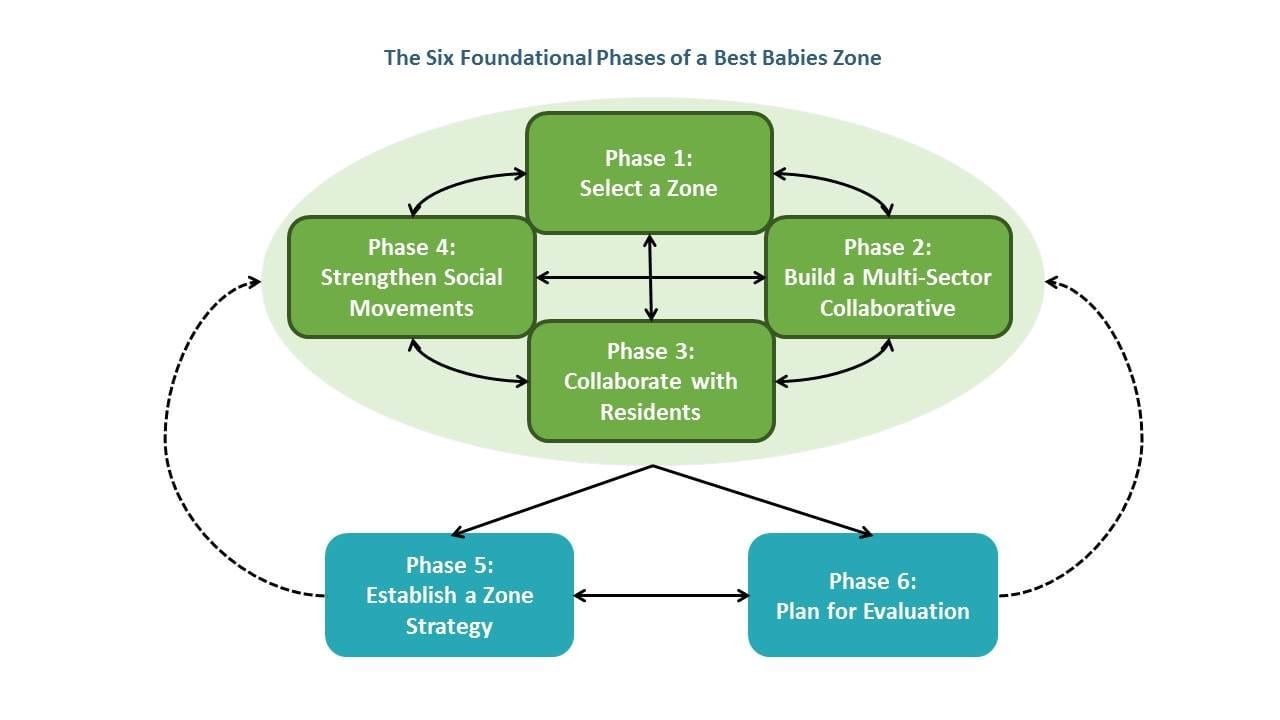

In policy and systems change work, the gap between theory and practice is a frequent challenge. How do we bridge the divide that can emerge between the knowledge gained through research and the knowledge gained through on-the-ground experience?
At Harder+Company, we take the task of bridging theory and practice seriously. We often work with clients to bring community perspectives and an equity framework into their social change work, and we work hard to translate research findings into products that can speak to different audiences and information needs.
Our work with the Best Babies Zone Initiative (BBZ), launched in 2012 by Dr. Cheri Pies and colleagues at the University of California, School of Public Health, is an example of how we’ve done this. BBZ, which is funded by the W.K. Kellogg Foundation, is a place-based initiative working in nine cities nationwide to advance community-driven approaches to reducing racial inequities in infant mortality and birth outcomes. In every city where it operates, BBZ places a strong emphasis on community engagement. The BBZ team works to connect theory and practice by supporting local leaders to design projects that work for their communities.
Location of Best Babies Zones
 The heart of BBZ is the work that takes place in each of the Zones. Each Zone was established in a small geographic area according to a set of consistent criteria, including the existence of poor birth outcomes with racial inequities in these outcomes and the presence of strong community-based organizations. Within each Zone, a local lead agency coordinates organizational partners and community residents around a common vision for achieving improved birth outcomes.
The heart of BBZ is the work that takes place in each of the Zones. Each Zone was established in a small geographic area according to a set of consistent criteria, including the existence of poor birth outcomes with racial inequities in these outcomes and the presence of strong community-based organizations. Within each Zone, a local lead agency coordinates organizational partners and community residents around a common vision for achieving improved birth outcomes.
Now in its seventh year, BBZ draws on a range of theories from public health, community organization, and beyond. One important framework used by BBZ is the life course theory of health, which proposes that “disproportionate exposure to risk factors at sensitive periods of development and throughout a lifetime may increase the risk for poor birth outcomes from one generation to the next.” This and other theories guided the formation of the BBZ Initiative and are still essential to the work today. BBZ leaders continuously bring research to conversations with on-the-ground Zone staff, and provide tools such as “BBZ Basics,” a how-to guide that helps integrate research frameworks in the design and implementation of place-based work.  As BBZ’s evaluation partner since 2013, Harder+Company has focused on supporting ongoing, developmental learning, as well as increasing the internal evaluation capacity of the local and national leadership. Through this work, we have played a role bridging theory and practice in a number of ways, including:
As BBZ’s evaluation partner since 2013, Harder+Company has focused on supporting ongoing, developmental learning, as well as increasing the internal evaluation capacity of the local and national leadership. Through this work, we have played a role bridging theory and practice in a number of ways, including:
- Working with Zones to develop customized evaluation plans and a set of recommended tools as part of evaluation technical assistance;
- Facilitating technical assistance sessions for Zone staff in the use of tools such as social network analysis that allow research-informed learning and planning;
- Documenting the ways Zones are using research frameworks, the questions they have, and where they need more support, and reporting back to BBZ leadership regarding areas for technical assistance; and
- Facilitating discussions of research findings with Zone staff that provide opportunities to connect research findings with local work and discuss questions that come up.
Through these and other efforts with BBZ, we see how evaluation that is embedded throughout the work can help surface ongoing experiences. This enables us to apply research frameworks to place-based work. Practical how-to guides such as BBZ Basics that codify pilot efforts and provide a clear, research-based starting point for people new to the work also have great potential to help support links between research and practice. With BBZ, we have seen clearly the value of collaborative, developmental evaluation work in helping to bridge theory and practice, and continue to learn as the Initiative expands to new Zones.
